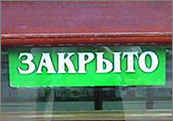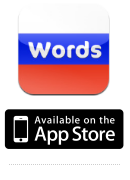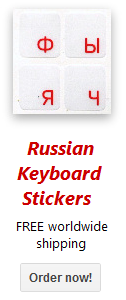 FR FR |
About us | Home | User agreement | Link to us |
Long and Short Forms of Adjectives
So far we learned how to form long adjectives (красивый - beautiful, лёгкий - easy). In addition, Russian adjectives have a short form. To be more precise, only qualitative adjectives may have both long and short forms (лёгкий - лёгок, красивый - красив). In today's conversational Russian the usage of long adjectives is preferred. However, you will most likely have to use the short form of an adjective in the end of a sentence. For example:
| Long adjective | Correct usage (short form) |
Wrong usage (long form) |
| занятый (occupied) |
Эта комната
занята. (This room is occupied.) |
Эта комната
занятая. |
| согласный (agree) |
Я с Вами согласен. (I agree with you.) |
Я с Вами
согласный. |
Short adjectives change only by gender and number; they do not change by case as long adjectives do. Singular masculine short adjectives do not have an ending, singular feminine adjectives end in -a, and singular neuter adjectives end in -o. All plural short adjectives end in -ы.
Endings for short
adjectives
(stressed vowels are underlined)
| Singular | Plural (any gender) (-ы) |
||
|
masculine (no ending) |
neuter (-o) |
feminine (-а) |
|
| весел молод |
весело молодо |
весела молода |
веселы молоды |
Short adjectives usually describe temporary qualities, as opposed to long adjectives that refer to constant and general qualities. For example, we say:
Ольга -- счастливая девушка.
(Olga is a happy girl.) -- constantlyВчера вечером она была очень счастлива.
(She was very happy last night.) -- temporarily
| Remember ! There are no short forms for the adjectives большойand маленький. Use short forms for the adjectives великий and малый instead, i.e. the words великand малrespectively. |
Short adjectives can also refer to qualities with respect to a particular person, thing or circumstances. For example:
Папин костюм сыну велик.
(The father's suit is big for the son.)
You already know that masculine short adjectives have no endings. But there is a special rule to form a short form of those masculine adjectives that become too hard to pronounce. In this case you should add a letter O before the last K, and letter E before the last H. Consider the following examples:
| O before K: |
низкий - низoк ("низк" is hard to pronounce because it has two consecutive consonants in the end) |
| E before H: |
трудный - трудeн ("трудн" is also hard to pronounce) |
There are no short forms for the adjectives большой (big) and маленький (small). Use short forms for the adjectives великий (great) and малый (small) instead. These forms change by gender and number as follows (stressed vowels underlined):
- for большой (великий):
masculine singular: велик feminine singular: велика neuter singular: велико plural: велики
- for маленький (малый):
masculine singular: мал feminine singular: мала neuter singular: мало plural: малы
Some Russian adjectives do not have a short form. In general, those are adjectives formed from nouns and ending in:
- -ский (братский, дружеский)
- -овой, -евой (деловой, боевой)
- -ной, -ный, -ний (главный, лишний, поздний)
There is also the short adjective рад (glad) that does not have a long form.
Got questions?
Ask them in the Russian Questions and Answers — a place for students, teachers and native Russian speakers to discuss Russian grammar, vocabulary, pronunciation, and other aspects of the Russian language.
Copyright 2001-2026 MasterRussian.com | Privacy Policy | Contact Us
 Russian Lessons
Russian Lessons
- Russian alphabet
- Names of letters
- Russian Q&A new
- Pronunciation: Cons.
- Pronunciation: Vowels
- Noun Gender/Number
- Cases of Nouns
- Russian Greetings
- Personal Pronouns
- Learning Russian
- 1000 Common Words
- 500 Russian Verbs
- Top Russian Nouns
- » All lessons
- » Guest lessons
 Browse Topics
Browse Topics
- Start learning Russian
- Forum
- Bookstore
- Dictionaries
- Russian - basic
- Russian - adv
- Pronunciation
- Russian Blog new
- Reading
- Test & quizzes
- Translation
- Verbs
- Verb Conjugations
- Russian numbers
- Russian Tests new
- Vocabulary
- Writing
- Folk music
- Fun stuff
- Leo Tolstoy
- Learner's lore
- Literature
- Personal blogs
- Picture Dictionary new
- Proverbs
- Publications
- Radio & TV
- Russian culture
- Schools in Russia
- Russian Words
- Russian names
- Software
- Russian Words iPhone
Clicks the "Like" button below to get daily updates on Facebook!
Click "Add to circles" to learn Russian on Google+

Search MasterRussian

English » Russian dictionary

WORD OF THE DAY
![]() RSS
|
iGoogle
|
My Yahoo!
RSS
|
iGoogle
|
My Yahoo!
Meaning: to be able to, can, may
Pronunciation: [mohch']
Learn Russian words! »
TODAY'S STREET SIGN

Russian: Закрыто
English: Closed
FOLLOW US ON TWITTER

MasterRussian on Twitter


